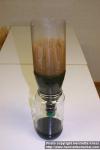Percolating a lemon verbena tincture.
I picked up some dried herb while in Germany, a month or three ago.
It was labelled vervain (Eisenkraut, vervaine (Verbena officinalis), but after a closer look (and a good sniff), I noticed that it was in fact lemon verbena (Zitronenverbene, Aloysia triphylla).
I wouldn't have bought it if it had been labelled correctly. I grow my own lemon verbena, and that is much more fragrant than the pale green stuff I got in this German tea shop.
'course, I also grow my own vervain (Verbena hastata), but alas, there's never enough of it...
A note to the Germans. While lemon verbena might sound like verbena, they're not the same. It's called lemon verbena because it's in the Verbenaceae, but they're not any closer related than that.
Honest. One's a Verbena, the other is an Aloysia (previously Lippia).
So I took this dried herb with me for something to tincture, a couple weeks ago when I went teaching. I picked this one because vervain is a nice little liver herb, and if everybody weren't talking about St. John's wort they'd all be talking about verbena, for nerves and depression.
So bummer on it being in fact lemon verbena, right?
Not quite.
Lemon verbena is in fact a mood lifter - it works much like scented geraniums, rose petals, and lemon balm, in that you smell it and you smile. That lemony scent comes through nicely in the taste of the tincture. In addition, it's also surprisingly bitter, which means it's a nice little liver herb.
So that's cool.
Percolating: a lemon verbena tincture
 Pic: Percolating lemon verbena.
Pic: Percolating lemon verbena.
Powder up 100 g dried lemon verbena, pour into measuring jar, press down as much as you can, and estimate how much less than the 300 ml you got it actually is cos the vitamix didn't really make all that fine a powder. Because I've percolated often enough I estimated that to be 250 ml.
A lemon verbena tincture should be 1:5 60 %, that's 100 g dried herb to 500 ml menstruum, in this case 60 % alcohol.
For percolation you need to add the volume's worth of menstruum, that is, 250 ml; so the total need for 60 % alcohol is 750 ml.
Add 2/3 of the volume in menstruum to the herb to moisten it overnight; that is a bit under 200 ml.
Then stuff the percolator: open the cap up wide (don't remove it though) (this will allow air to escape downwards as you pour in menstruum at the top), put a filter in the bottom, add your overnight-moistened herb, pack it reasonably tightly, add another filter on top (so that the packed herb won't rush up into the menstruum as you start to pour), pour the rest of your menstruum on top, close the cap until it's almost shut, and let drip, at 1-2 drops a second (hum "Toreador" from Carmen, that works).
- If your tincture gushes out you need to adjust the cap - screw it tighter.
- If your tincture doesn't drip you need to adjust the cap - open it a teensy little bit more.
- If you've removed the cap altogether and don't get a drip after hours of waiting you've packed your herb too tightly for percolation. Ditch the percolation setup, add more dried herb to your herb-menstruum mix (so that the ratio is again 1:5, not 1:7.5), and macerate the lot for 1-4 weeks instead.
Make your own percolator
- A percolator can easily be made with a 2-l lemonade bottle - just saw off the bottom. Retain the cap, you'll need it.
- Or tie a flammable-liquid-dripping bit of string around the bottom of a nice big sloping-neck clear glass bottle, hold the bottle bottom-up, set the string on fire, and wait until the flame has been heating the glass all around for a couple minutes. Then douse the fire in a bowlful of water and icecubes. If you did things right (that is, not in midwinter, when it's cold, outdoors) your bottle will crack and a small tap will remove the bottom altogether. Use some sandpaper to remove sharp edges, that is, if you didn't get cracks up the sides of the bottle. If you did it'll leak, so try again.
- Or have a glass cutter remove the bottom of a nice large sloping-neck clear glass bottle.
- Or pay yourself silly and have a glass blower make a percolator cone for you.
A percolated tincture is done the next day, but needs more alcohol.
A macerated tincture is done in a week or four, and needs less alcohol.
You can't percolate fresh herb.
--
Related entry: Making tinctures


Comments
very interesting. enjoy your
very interesting. enjoy your articals in other media and bogs very much as well as yor blogs. wish i ad more time to read more. thanks for being here.
lee/leo